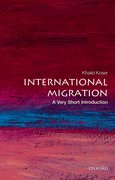By Khalid Koser
Migration has had a rough ride in recent years. During times of recession, anti-immigrant sentiments often increase. Minor political parties around the world have taken full advantage and gained political capital from xenophobic policies. In many countries the media has followed suit, systematically reporting on migrants in negative terms. And political leaders are finding it hard to swim against this rising tide.
For sure migration can pose significant challenges, although often these are not the challenges that politicians, the media and the public worry about. There is very little evidence, for example, that migrants compete directly with locals for work, or that they represent a burden on the welfare state, or that they any more inclined than nationals to be criminals or even potential terrorists.
The real challenges arise around the very small proportion of migration that is unmanaged; or where migrants do not do enough to integrate; or where hyper-diversity challenges the delivery of public services (try being a teacher in a class where the students have six different mother tongues). Neither should we forget the challenges faced by migrants themselves: hundreds of drowned in the Mediterranean in the last month; while according to Amnesty International migrant workers building the infrastructure for the 2022 World Cup in Qatar are being ‘treated like animals’.
Not only have we tended to focus on the wrong challenges arising from migration; we have also failed to do proper justice to its opportunities and benefits, which in most circumstances far outweigh the negatives. Migration can drive economic recovery, lift millions out of poverty, and make the world a more interesting place.
The evidence is quite conclusive that migrants contribute positively to economic growth in the countries where they settle. Skilled migrants drive innovation and competitiveness, which is why so many countries are desperate to attract them. Overseas students are the main revenue source for many universities, and in effect subsidize local students. In the United States, immigrants are 30% more likely to form new business than US-born citizens. Lower-skilled migrants can reduce labour costs to employers and in turn keep down prices for consumers. Taxes paid by immigrants and their children exceed the costs of the services they use in almost every study.
Migrants also contribute to development, and at a far greater scale than official development assistance. According to the World Bank each year migrants send home over US$ 400 billion, comprising a significant proportion of GDP in many developing countries. There is strong evidence from a wide variety of developing countries that remittances can reduce poverty at the family level, increase access to education and health, promote rural economic development, and empower women. Migration relieves unemployment in origin countries, and provides the best route out of poverty for many people.
Migration also has benefits beyond the purely economic. It is not a silver bullet but it is one way to help reduce the challenges of ageing and declining populations in a wider range of countries across the developed world. It is the engine for global cities, which are built on social and cultural diversity. Even if you or your recent ancestors are not migrants, I challenge you to follow your favourite sports team, watch a movie, read a book, listen to music, or just go out for a meal, and tell me that migration is not part of your story.
The negative stereotypes around migration need to be corrected. But positive stereotypes are just as irresponsible. What is really needed is a sensible debate about the pros and cons of migration, and in many countries we are losing the space to have that debate. Being concerned about migration doesn’t mean that you’re a racist, but neither does supporting migration mean that you are a betraying your country.
One thing is for sure and that is migration is here to stay. There are around 240 million migrants in the world, comprising one in every 33 people. The number is bound to grow, and the proportion to remain significant. If we can’t celebrate migration, at least we should try to understand it.
Khalid Koser is Deputy Director and Academic Dean at the Geneva Centre for Security Policy and the author of International Migration: A Very Short Introduction
The Very Short Introductions (VSI) series combines a small format with authoritative analysis and big ideas for hundreds of topic areas. Written by our expert authors, these books can change the way you think about the things that interest you and are the perfect introduction to subjects you previously knew nothing about. Grow your knowledge with OUPblog and the VSI series every Friday and like Very Short Introductions on Facebook. Subscribe to Very Short Introductions articles on the OUPblog via email or RSS.
Subscribe to the OUPblog via email or RSS.
Subscribe to only current affairs articles on the OUPblog via email or RSS.
Image credits: Immigration march in Los Angeles from iStock; Citizen documents from iStock





Recent Comments
There are currently no comments.